
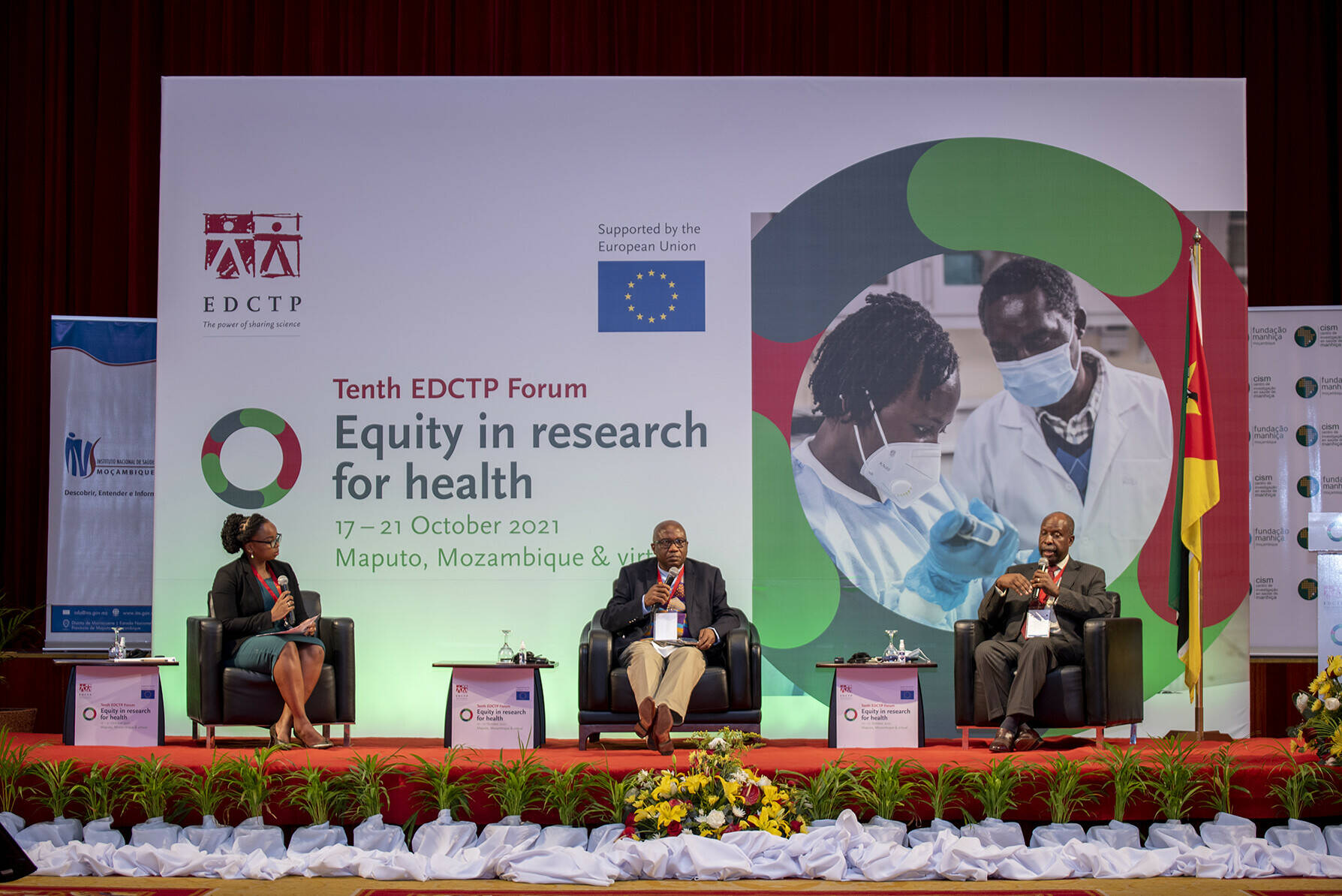
scroll down
Opening and Plenary I
Prior to the opening session, conference participants had already enjoyed a preview to the Forum, with music and a roundtable and panel discussion about what the Forum had in store. The official opening was by His Excellency Mr Filipe Jacinto Nyusi, President of the Republic of Mozambique. Dr Leonardo Simão – as Chair of the Local organising committee, relayed his pleasure in welcoming the President and thanked him for honouring the Forum with his presence. Chair of the Forum Scientific Programme committee, Prof. Catherine Hankins noted that the Forum had already been delayed one year and EDCTP could not let a further year go by before sharing the wealth of scientific findings that would be presented.
Plenary III
Dr Leonardo Simão gave a keynote address on science diplomacy and its long history in research. As scientists progress in their careers, they work for and with many types of organisations. Science contributions are now submitted to UN and other global bodies to inform their decision-making. In such situations, scientists need to acquire the skills of diplomacy. One challenge is to persuade authorities to take up the results of research in their decision-making. We must make a bridge between scientists and policy makers and Africa must develop its science diplomacy to address its health challenges.
Plenary III
For the first time at an EDCTP Forum, there was an interactive debate with voting. Two teams, each comprising two distinguished scientists debated the proposition that Equity in innovation, partnership, and research is a desirable but unrealistic goal. There were also points raised, both for and against, by online participants. The motion was defeated – we believe equity is feasible!
Plenary V
Ms Spelberg’s address was followed by the closing ceremony in which seven distinguished speakers commented on the proceedings, considered to have been a great success, and thanked the many organisations and individuals whose hard work and commitment had made it possible.
Ms Andrea Spelberg from the German Federal Ministry of Education and Research (BMBF), presented EDCTP as a blueprint for international cooperation in global health. Its strategy has proved successful, thanks particularly to its emphasis on partnership, African leadership and regional collaboration. She encouraged all to communicate the success of EDCTP to political leaders. Nevertheless, EDCTP does face challenges both due to the impact of COVID-19 itself and the changes in the research and funding landscape that are already taking place as a result of the pandemic. She highlighted the need to take this into account in the development of the programme for the Global Health EDCTP3 Joint Undertaking. Stock taking is required in which we must identify and learn from past successes and failures. Countries must renew their commitment, politically and financially. A strategy must be developed that is fit for the future.

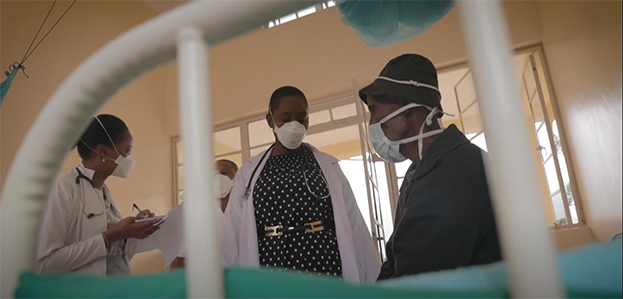

Plenary IV
Two keynote addresses were given. A timely contribution came from Dr Esperança Sevene from Eduardo Mondlane University (Mozambique) speaking on COVID-19 Maternal Immunization prioritization and implications for pharmacovigilance: the case of Mozambique. She outlined the process put in place in this country in the light of the pandemic. The vaccination programme has made encouraging progress despite the inadequate number of vaccine doses so far received. It has been decided to include pregnant and lactating women in the programme and this has made it necessary to step up pharmacovigilance efforts to detect and investigate any cases of adverse events following immunisation.
Professor Tumani Corrah of the Africa Research Excellence Fund (AREF, United Kingdom and The Gambia) began by considering the current state of public health systems in Africa which are ‘unacceptable and shamefully under-resourced’. Given the effects of population growth, deforestation, climate change and increased air travel, the situation was ‘precarious’. Nevertheless, with commitment and with African leadership the continent could become a powerhouse of research. One challenge to be overcome is the current lack of opportunity for postdoctoral African medical researchers. Prof. Corrah described the AREF progamme, which seeks to enhance health research capacity development in Africa, among other initiatives.
Plenary II WHO Special Session on malaria vaccines
The special session A new era for malaria control: the role of malaria vaccines, co-hosted by WHO and EDCTP, included an overview of the current global malaria situation and four presentations on RTS,S – the first malaria vaccine for use in African children. In this session, WHO and partners shared 2 years of data from the pilot programme and discussed next steps for the broader use of RTS,S as a new preventive tool in the malaria control toolkit. Participants also took stock of new malaria vaccine candidates in the pipeline and of new initiatives to evaluate and produce vaccines in Africa.
WHO considers RTS,S as a pathfinder that could be complemented in the future by other vaccines with similar or higher efficacy. Over the last decade, the partnerships forged by EDCTP with the African research community have contributed to the development of both the RTS,S vaccine and to several new candidate malaria vaccines. Excitingly, there were three presentations about promising malaria vaccines in the clinical development pipeline. This included a presentation from Prof. Adrian Hill from the University of Oxford on the latest data on R21/Matrix-M malaria vaccine candidate. A recent phase II trial published in The Lancet, demonstrated that this candidate is safe, immunogenic and has an efficacy of 77%, exceeding the WHO goal of 75% efficacy for malaria vaccines
Networking
One of the biggest challenges in these digital times is networking. The Forum organisers have used the online conferencing platform to the fullest to connect stakeholders across the globe. The Meet-the-expert sessions proved a great opportunity to reach out to senior researchers and ask questions and exchange ideas. Networking groups were active every day in which Forum delegates could connect to other delegates.
The main programme of the Tenth EDCTP Forum ran from 18 to 20 October 2021, featuring plenary presentations by keynote speakers, scientific sessions of oral and poster presentations, and sponsored symposia. On Sunday 17 October Mozambique, the host country and member of the EDCTP Association, showcased its participation in EDCTP projects and the value EDCTP adds to health research in Africa. On Thursday 21 October, there were additional workshops and symposia organised by EDCTP stakeholders. Four EDCTP prizes were awarded that recognise outstanding individuals and research teams from Africa and Europe who have made significant achievements in their research field.
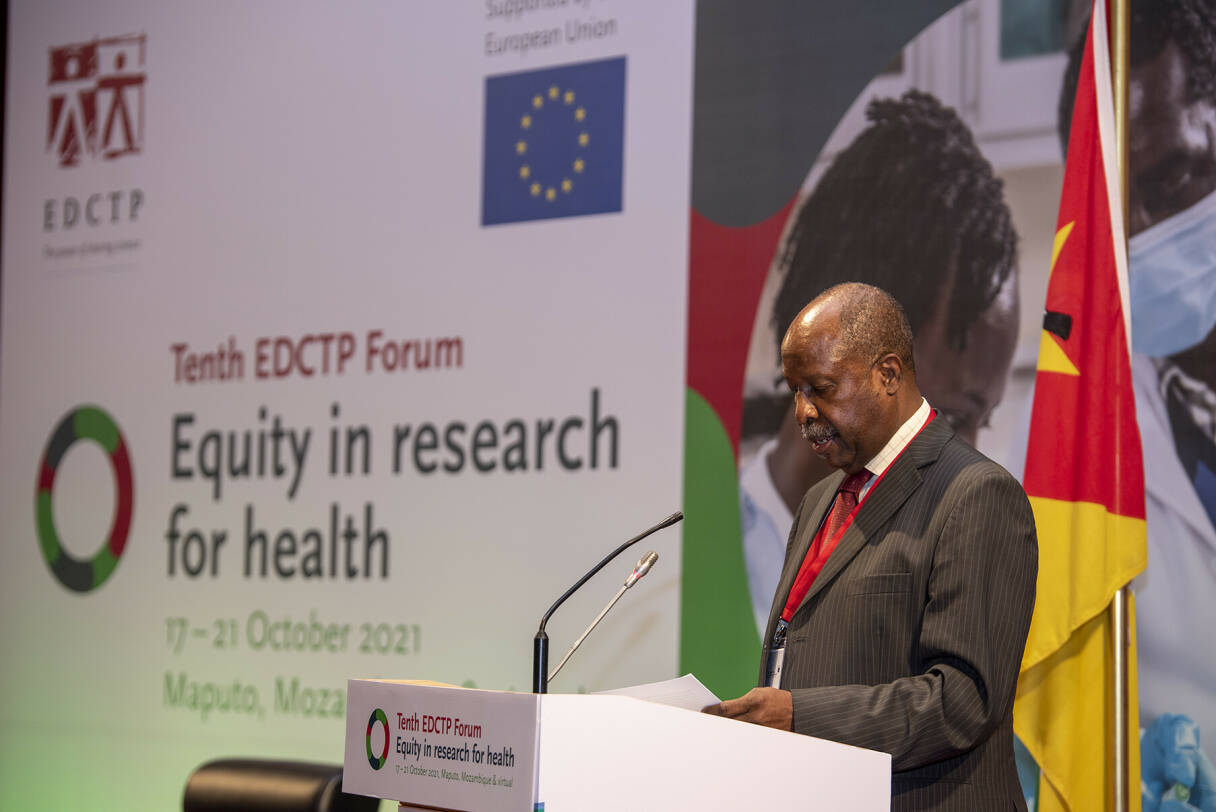
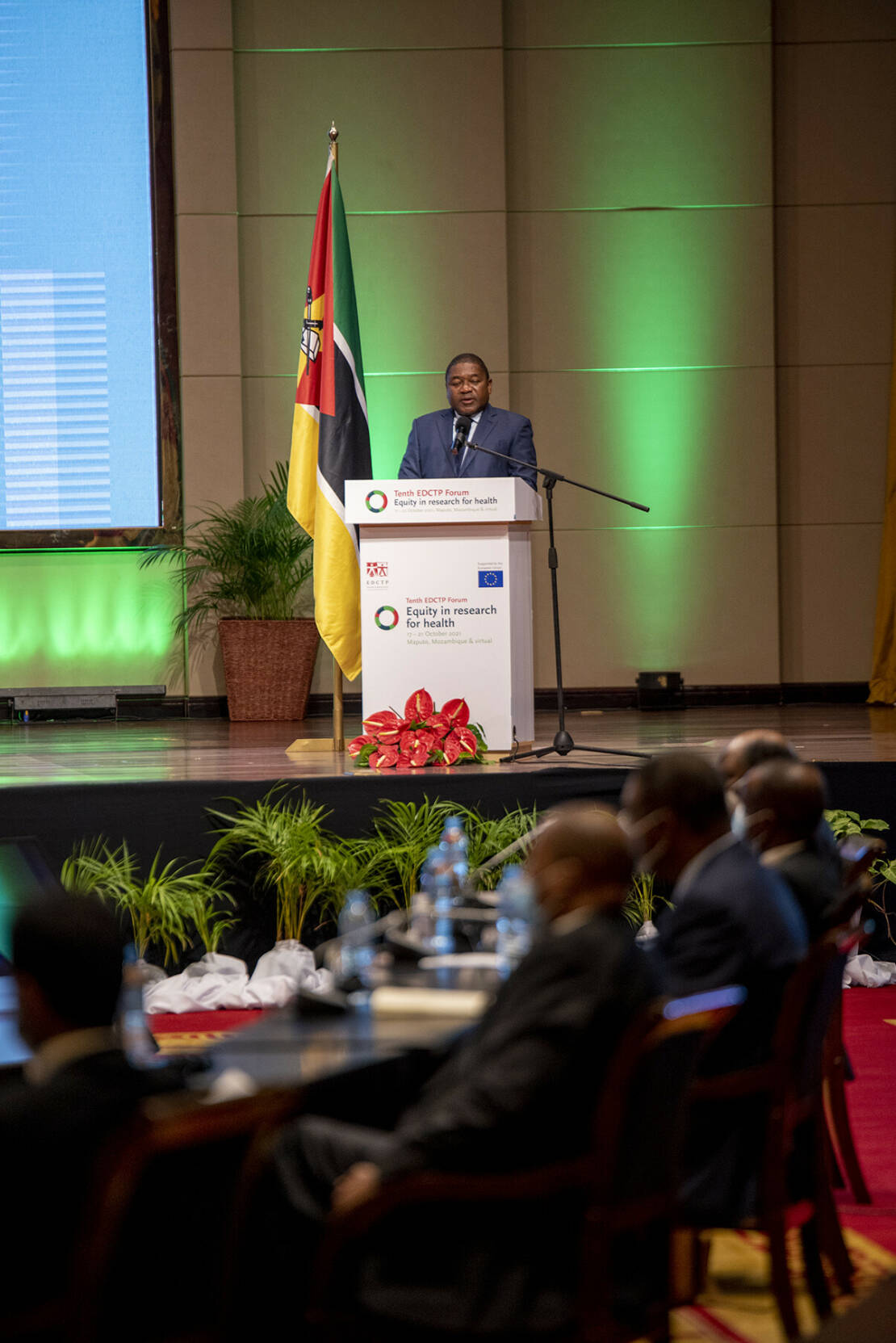
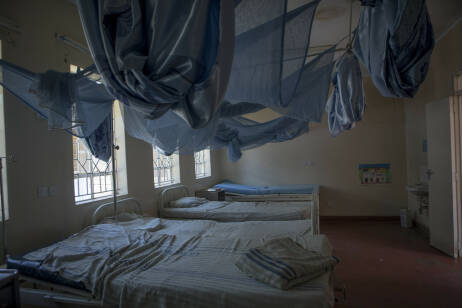
New horizons for malaria vaccines

The science: parallel sessions, oral presentations and sponsored symposia
The core of any EDCTP Forum is the reporting of new scientific findings. “There’s so much science here!” said Catherine Hankins. This time there were 27 parallel sessions and oral presentations on a diverse range of topics. The scientific programme of EDCTP’s Tenth Forum was presented through four tracks.
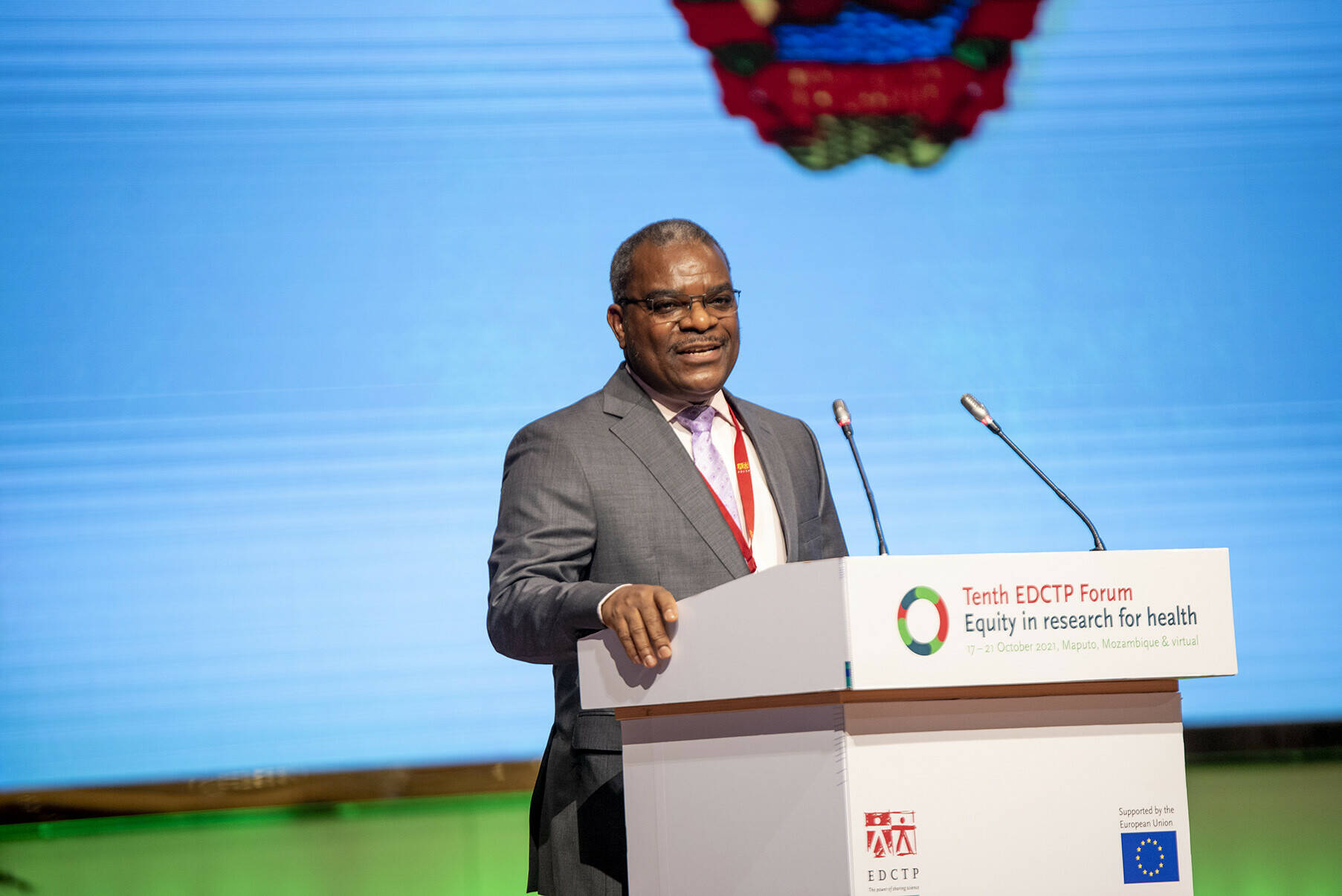

In this video, representatives of the EDCTP member countries, members of the EDCTP Advisory Committee and European Commission share their views about the EDCTP2 programme, looking forward to the successor EDCTP programme.
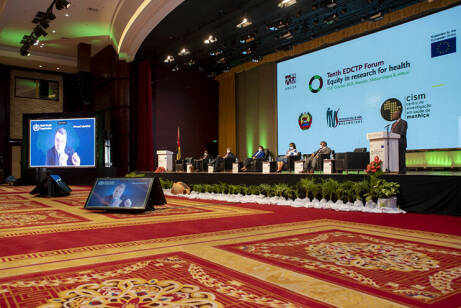
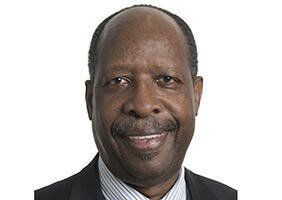
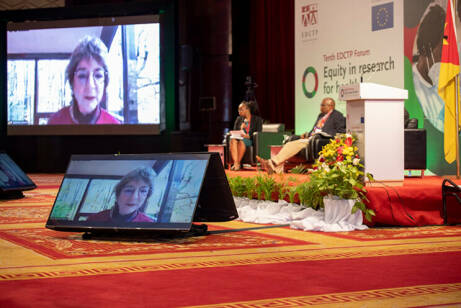
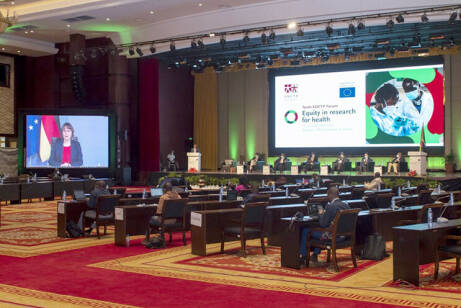
scroll down
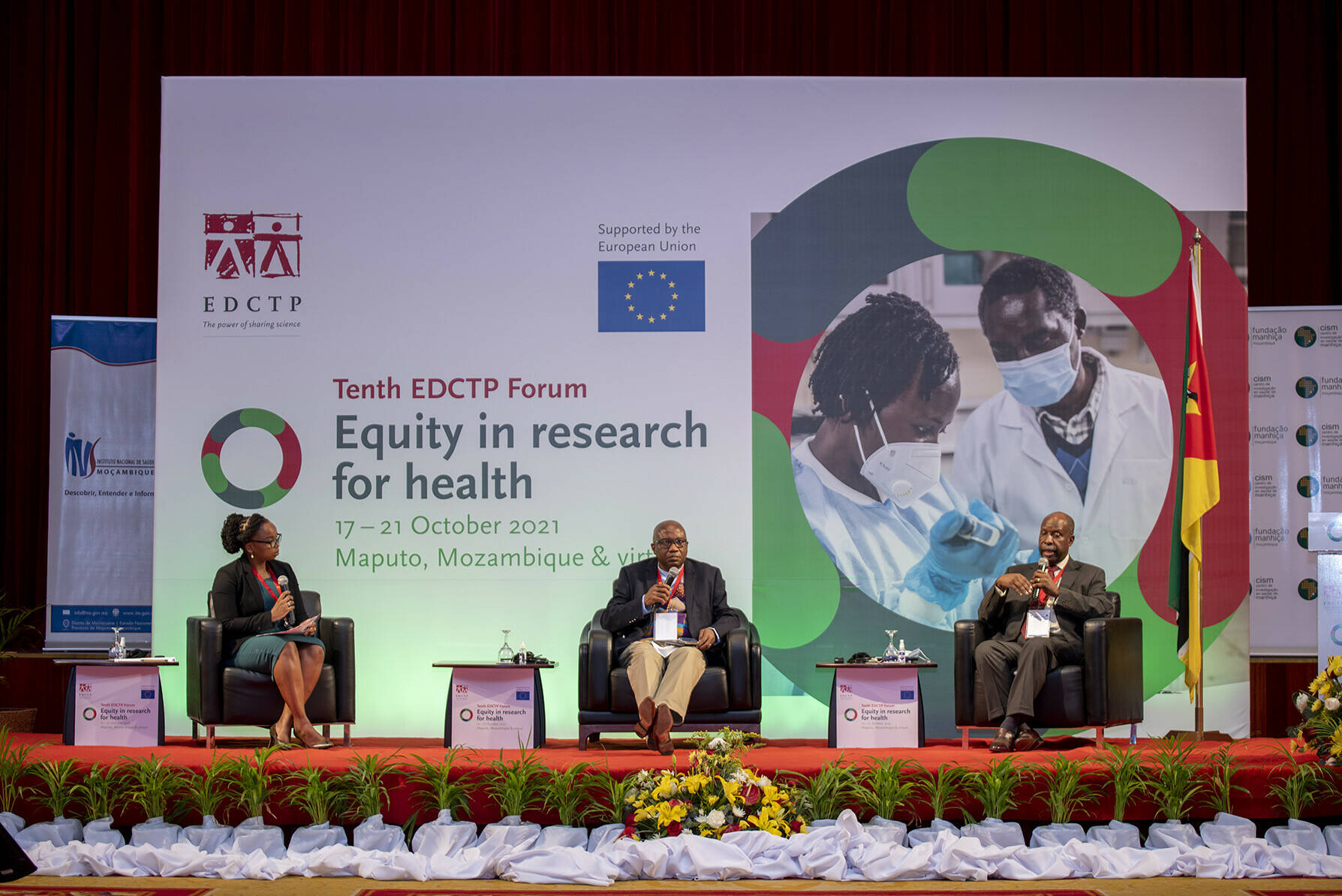

Competitive and prepared
The EDCTP regional Networks of Excellence have been synergising their infrastructure, expertise and collaborative connections (at national and regional levels) to strengthen African health research ecosystems. The aim is to make African clinical research collaborations globally competitive and also able to respond to infectious disease outbreaks and pandemics. The COVID-19 pandemic clearly showed the scientific and health care value created in the many years of clinical research capacity building in sub-Saharan Africa.
Networking
One of the biggest challenges in these digital times is networking. The Forum organisers have used the online conferencing platform to the fullest to connect stakeholders across the globe. The Meet-the-expert sessions proved a great opportunity to reach out to senior researchers and ask questions and exchange ideas. Networking groups were active every day in which Forum delegates could connect to other delegates.
Currently, most successful research programs in Africa are being carried out by international consortia or networks. Therefore, TESA collaborates with various other networks that operate in the region, e.g. the MOSASWA (Mozambique, South Africa, Swaziland Cross-Border Malaria Initiative), ARISE (Africa Research Initiative and Support Network) and ECRIN (European Research Infrastructure). In addition, TESA has been very active and successful in bringing Namibia, Angola and Eswatini within the network.
Plenary III
The East African Consortium for Clinical Research (EACCR) was set up in 2009. It has been involved in projects on the retention of HIV-infected mothers and their babies in HIV care, and in HIV pharmacovigilance in young people. On malaria, it has been involved in epidemiological studies and clinical trials of artemisinin-based combination therapy and antimalarial resistance. Additionally, the network is successfully collaborating with the East African Community Health Research Commission (EACHRC) on regional sharing of research evidence and actively facilitating researcher-policymaker dialogue.
The network also invests in preparing resource-limited clinical research sites to conduct clinical trials on the infectious diseases that burden the region. EACCR has developed an e-learning centre that hosts peer-reviewed and globally applicable short courses required for high-quality clinical studies. This is currently being strengthened by the addition of a regionally harmonised training course to qualify as Clinical Research Associate.
Importantly, it established a regional pool of trained clinical trial monitors to support a high quality of clinical trials across the region. EACCR’s reciprocal monitoring scheme is an innovative, practical and affordable scheme for quality management of health research. The monitors are qualified to be independent monitors, some also having accreditation with the Association of Clinical Research Professionals. To date, several clinical research studies (vaccine trials, drug safety studies, epidemiological studies and longitudinal intervention studies) across Africa have been monitored by EACCR monitors.
CANTAM
The Central African Network on TB, HIV and Malaria (CANTAM), established in 2008, has been involved in epidemiological studies on adverse events, antimicrobial resistance, antimalarials, pharmacovigilance, host-directed therapies for tuberculosis, and, most recently, clinical studies on traditional medicines for parasitic and viral infections. The network also actively responded to the Ebola Virus Disease outbreak. Network-trained researchers were deployed to work with national public health institutes in the fight against the disease.
CANTAM developed a flexible, ready-to-apply methodological framework for the implementation of clinical trials and other clinical studies during public health emergencies. It includes regulatory and ethics review steps for managing such outbreaks. This timely developed framework also plays a crucial role in the response to the COVID-19 pandemic in the region.
Moreover, the network keeps investing in training activities to strengthen pharmacovigilance, national regulatory authorities and ethics committees, a regional capacity gap which is being addressed with urgency.
Addressing the gender gap in clinical research capacity is another priority area for CANTAM which led it to develop a strategy to involve more women in medical research. The network initiated a project entitled ‘Women and Science’ which promotes ‘Girls in science’ in local schools and aims to mitigate the marginalisation of female scientists through the establishment of a career development fellowship for post-doctoral female researchers in Central Africa. This project is being rolled out across Central Africa via the EDCTP-funded fellowship programme WISE which aims to strengthening gender capacity in clinical research within the CANTAM network.
Plenary II WHO Special Session on malaria vaccines
The special session A new era for malaria control: the role of malaria vaccines, co-hosted by WHO and EDCTP, included an overview of the current global malaria situation and four presentations on RTS,S – the first malaria vaccine for use in African children. In this session, WHO and partners shared 2 years of data from the pilot programme and discussed next steps for the broader use of RTS,S as a new preventive tool in the malaria control toolkit. Participants also took stock of new malaria vaccine candidates in the pipeline and of new initiatives to evaluate and produce vaccines in Africa.
WHO considers RTS,S as a pathfinder that could be complemented in the future by other vaccines with similar or higher efficacy. Over the last decade, the partnerships forged by EDCTP with the African research community have contributed to the development of both the RTS,S vaccine and to several new candidate malaria vaccines. Excitingly, there were three presentations about promising malaria vaccines in the clinical development pipeline. This included a presentation from Prof. Adrian Hill from the University of Oxford on the latest data on R21/Matrix-M malaria vaccine candidate. A recent phase II trial published in The Lancet, demonstrated that this candidate is safe, immunogenic and has an efficacy of 77%, exceeding the WHO goal of 75% efficacy for malaria vaccines
Opening and Plenary I
Many institutions in sub-Saharan Africa lack research laboratories that are ISO accredited and comply with standards of Good Clinical and Laboratory Practice. The establishment of the NoEs provided an opportunity for systematic infrastructural upgrades in order to achieve compliance with international requirements
In 2012, EDCTP initiated a laboratory strengthening project within the four regional NoEs to systematically develop 24 clinical research and public health laboratories towards internationally recognised accreditation. The WHO-AFRO Stepwise Laboratory Improvement Process Towards Accreditation (SLIPTA) was used to benchmark and develop the selected laboratories towards accreditation. To date, seven laboratories in the networks have successfully achieved and/or maintained their ISO 15189:2012 accreditation. These are: CHU A. Le Dantec in Senegal, Medical Research Council The Gambia in The Gambia; Kenya Medical Research Institute/Centre for Disease Control (Kisian Campus) in Kenya; Medical Research Council–Uganda Virus Research Institute in Uganda; the Central Tuberculosis Reference Laboratory in Tanzania; the Manhiça Health Research Centre in Mozambique; and the Nigerian Institute For Medical Research. These accredited laboratories linked to the networks of excellence are now able to compete globally for high-quality research projects adhering to international standards.
The main programme of the Tenth EDCTP Forum ran from 18 to 20 October 2021, featuring plenary presentations by keynote speakers, scientific sessions of oral and poster presentations, and sponsored symposia. On Sunday 17 October Mozambique, the host country and member of the EDCTP Association, showcased its participation in EDCTP projects and the value EDCTP adds to health research in Africa. On Thursday 21 October, there were additional workshops and symposia organised by EDCTP stakeholders. Four EDCTP prizes were awarded that recognise outstanding individuals and research teams from Africa and Europe who have made significant achievements in their research field.
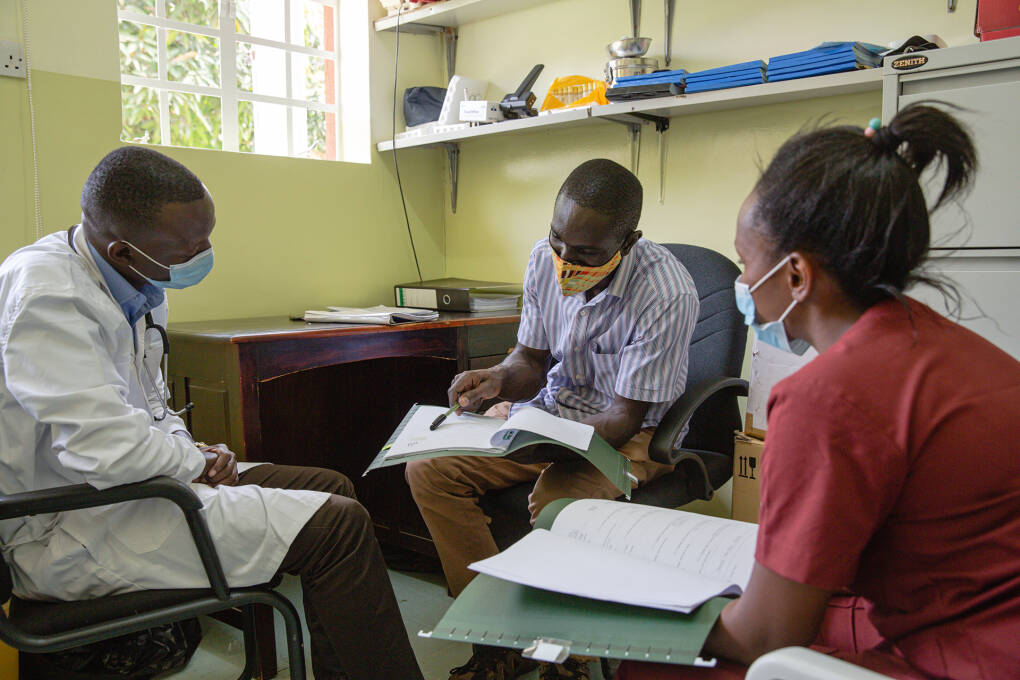
Each network is anchored within the four regional economic communities in the WHO-Africa region: the East African Community, the South African Development Community, the Economic Community of Central African States, and the Economic Community of West African States. These regional economic communities directly contribute to science and technology efforts strengthening the research environment in sub-Saharan Africa.
